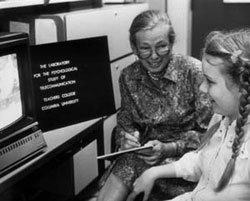Mary Alice White, Leading Psychologist in Computers and Learning, Dies at 80
Mary Alice White, who was Professor Emeritus of Psychology and Education, Director of the Laboratory for the Psychological Study of Telecommunication, and one of the nation's leading psychologists to investigate the ways in which technology-including computers and television-change the way children learn, died in December 2000.
Professor White died at her home in Salisbury, Connecticut. She was 80 years old.
In the early 1980s, she was already calling for the integration of computers in the curriculum of schools, saying that computers were changing the very nature of learning and communication. She also saw that people were moving away from learning from print and toward learning from imagery.
In a September, 1981 edition of Educational Technology, White said, "We have come to the end of the print learning period, and have now started in on the electronic learning age...I'm trying to persuade you that the electronic age is here, that it is as big a revolution as the invention of the printing press, that we are dealing with children who come to us who have learned to learn electronically."
In a January 1982 New York Times article written by Fred Hechinger about Professor White, he noted her point about the arrival of the electronic age and her caution that "educators ought to adjust their teaching to it. But she also believes that people ought to know the consequences of what children see on television...She urges school psychologists and teachers to realize not only that ‘the electronic revolution is here' but that it also includes-in addition to television-computer programs, electronic games, word processors, cable and video disks."
She also led in the study of sex-stereotyping in television programming and analyzed ways in which television seemed to promote alcohol consumption (a continuation of some research she did in the 1950s on the hospital treatment of alcoholism).
A 1941 graduate of Vassar College with a B.A. in Economics, White received her M.A. (1944) and Ph.D. (1948) from Columbia University in Experimental Psychology.
In 1948, White began her career as an Assistant Psychologist at New York Hospital in White Plains, New York, where she went on to become the hospital's director of the psychology department until the early 1960s.
In 1962, White joined the Teachers College faculty as Professor of Psychology and Education. From 1972-1977 she became the Director for the Center for Behavioral Analysis of School Learning. From 1974 until her retirement in 1990, she was both Director of the Learning Assessment Service and Director of the Laboratory for the Psychological Study of Telecommunication.
She was the co-author of several books, including The School Psychologist, published in 1961 by Harper and Row, School Disorder, Intelligence and Social Class, published by Teachers College Press in 1968, Education: A Conceptual and Empirical Approach, published by Holt in 1973, and The Land of the Possible, published by Warner Books in 1979. She also authored more than thirty articles in learning psychoeducational journals.
White was an editor and founder of the Journal of School Psychology from 1963-73, a member of the Board of Directors of the American Board of American Psychology from 1963-69 and a member of the Executive Board of the New York State Psychological Association from 1963-66.
White is survived by her children, Christopher Kimball of Boston and Katherine Kimball of Bend, Oregon.
A memorial service for White was held on January 20, in the Chapel of the Salisbury School.
Published Tuesday, Sep. 18, 2001
